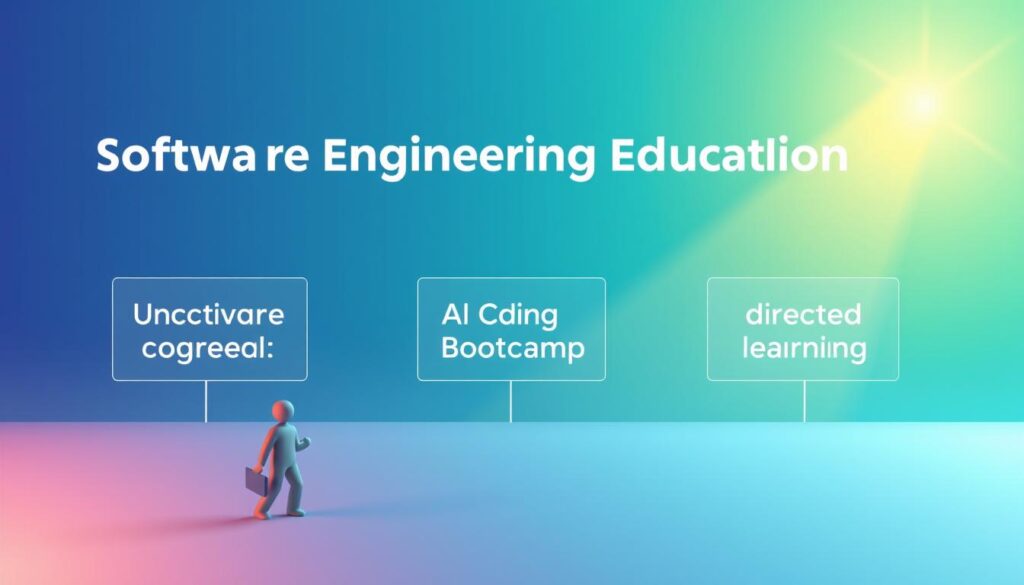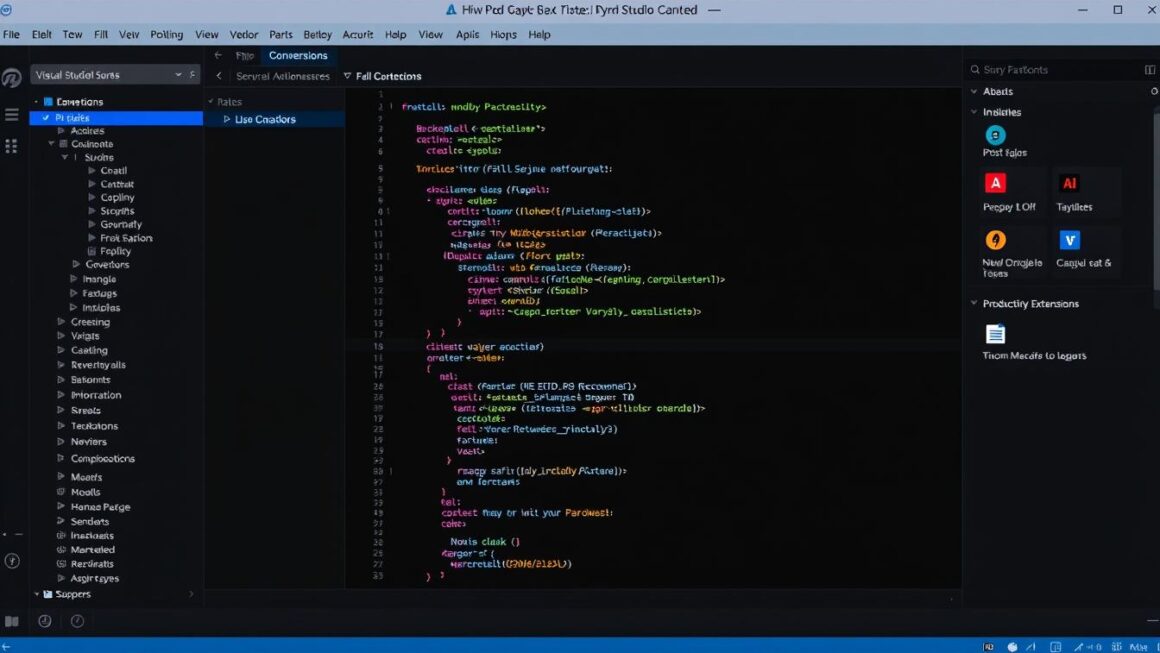The need for software engineers is growing fast. The Bureau of Labor Statistics says there will be a 22% increase in jobs from 2020 to 2030.
This growth comes from more companies using technology. So, software engineering is becoming a popular career choice.
A career in software engineering has many paths. You can work on new mobile apps or complex software systems.
To succeed in this field, knowing the basics is key. It’s important to understand what it takes to be a top software developer.
Key Takeaways
- Understand the growing demand for software engineers
- Explore various career paths in software engineering
- Learn the essential skills required for a software developer
- Discover the importance of staying updated with industry trends
- Gain insights into the daily life of a software engineer
The Reality of Software Engineering Today
Technology is moving fast, making software engineering more exciting than ever. The field is growing fast, thanks to new tech and a need for more skilled workers.
The Current Job Market Landscape
The job market for software engineers is booming. It’s expected to hit $1.03 trillion by 2027. But, there’s a big shortage of skilled workers, with 900,000 missing in the EU.
Demand Across Different Industries
Software engineers are needed in many fields, like finance, healthcare, tech, and entertainment. This is because companies want to use digital tools and create new software.
Salary Expectations by Experience Level
Salaries for software engineers change with experience. Newbies get good pay, while experienced ones earn even more. This shows how valuable they are to their teams.
Common Misconceptions About the Profession
There are many wrong ideas about software engineering. Two big ones are that engineers just code all day and that they work alone.
Coding All Day Myth
While coding is key, it’s not all they do. They also design, test, and work with teams.
The “Lone Wolf” Developer Stereotype
The idea of the lone developer is old news. Today, software making is all about teamwork. You need to be good at working with others and talking clearly.
It’s important to know what software engineering is really like before you start. By clearing up myths and showing how exciting it is, you can get ready for the journey ahead.
What I Wish I Knew Before Becoming a Software Engineer
Looking back, there are many things I wish I knew before becoming a software engineer. The job is much more complex than I thought.
The Importance of Continuous Learning
Continuous learning is essential in the fast-changing tech world. Most developers use online resources to learn, showing the classroom is not the only place for skills.
Keeping Up With Rapidly Changing Technologies
The tech world moves quickly. To stay current, one must adapt and learn new technologies all the time.
Good learning methods include online forums, webinars, and open-source projects.
Effective Learning Strategies for Developers
Developers can use many learning strategies. Online courses and certifications are popular, used by 46.63% of developers.
The Balance Between Technical and Soft Skills
Technical skills are vital, but soft skills are just as important for success in software engineering.
Communication Skills That Make You Stand Out
Being able to explain complex ideas simply is key. It greatly impacts how your work is seen by others.
Collaboration and Teamwork in Development
Software development is a team sport. It requires collaboration and a willingness to work together towards a goal.
Managing Expectations vs. Reality
One big challenge for new engineers is managing their expectations versus reality.
The Truth About “Imposter Syndrome”
Many new engineers feel like impostors, doubting their qualifications.
Dealing With Debugging Frustrations
Debugging is a big part of the job. Learning to handle frustration is essential for success.
Essential Technical Skills to Develop First
To be a top software engineer, you need to learn key technical skills. These skills help you solve problems, work well with others, and keep up with tech changes.
Foundational Programming Languages Worth Learning
First, pick the right programming languages. The choice depends on your area of interest in software development.
Frontend vs. Backend Considerations
For frontend work, learn JavaScript, HTML/CSS, and frameworks like React or Angular. Backend developers should focus on Java, Python, or C#. Use frameworks like Spring or Django.
Language Selection Based on Career Goals
Choose a language based on your career goals. For mobile app development, learn Swift for iOS or Kotlin for Android. For data science, Python and R are best.
Understanding Data Structures and Algorithms
Data structures and algorithms are software development’s foundation. They help write efficient, scalable code.
Core Concepts Every Developer Should Master
Key data structures include arrays, linked lists, and more. Algorithms like sorting and searching are also vital. Mastering these solves complex problems.
Practical Applications in Daily Work
In daily work, knowing data structures and algorithms optimizes code. This makes apps faster and more reliable. It’s about applying knowledge to real problems.
Version Control and Collaboration Tools
Version control systems and collaboration tools are key for teamwork.
Git Fundamentals for Beginners
Git is the top version control system. Start with basic Git commands like commit and push. Learn to manage branches and solve conflicts.
Working With Development Teams Effectively
Tools like GitHub or Bitbucket help teams work together. They offer features like pull requests and code reviews. These are key for quality codebases.
Education Pathways: Degree vs. Bootcamp vs. Self-Learning

Aspiring software engineers have many ways to learn, each with its own pros and cons. The choice between a degree, a bootcamp, and self-learning depends on your learning style, career goals, and budget.
Comparing Traditional Computer Science Degrees
Traditional computer science degrees give a full education in software engineering. They cover both the theory and practical skills needed.
Benefits of Theoretical Foundations
A solid theoretical base helps understand complex software engineering concepts. Theory is key for solving problems and innovating.
ROI Considerations for College Education
Getting a degree can be expensive, but it often means higher starting salaries and better career growth. Think about the cost versus the long-term benefits.
The Bootcamp Experience: Pros and Cons
Bootcamps provide a fast, practical education in software engineering. They focus on skills that employers want. They’re great for those who want to start their career quickly.
Selecting the Right Bootcamp Program
When picking a bootcamp, look at the curriculum, instructors’ experience, and job placement rates. A good bootcamp can really help you find a job.
Maximizing Your Bootcamp Investment
To make the most of a bootcamp, stay committed to learning and build a strong portfolio. Networking with others can also help a lot.
Self-Taught Success Stories and Strategies
Many successful software engineers learned on their own. They used online resources, worked on personal projects, and got involved in communities.
Structured Learning Plans for Autodidacts
Self-learners should make a learning plan, set goals, and track their progress. Online resources and tutorials can guide your learning.
Overcoming Challenges Without Formal Support
Self-learning is flexible but requires discipline and hard work. Being part of online communities can help you feel less alone and get support.
Building a Portfolio That Gets Noticed
For software engineers, a portfolio is more than just projects. It shows problem-solving skills and creativity. A good portfolio can really help you stand out in the job market.
Personal Projects That Demonstrate Your Skills
Personal projects are great for showing your technical skills. They show you’re proactive and eager to learn more than your usual tasks.
Project Ideas for Different Specializations
There are many projects you can do, depending on your area of expertise. For example, a front-end developer might make a website that looks good on any device. A back-end developer could work on APIs. Choose projects that challenge you and fit your career goals.
Showcasing Problem-Solving Abilities
When doing personal projects, aim to solve real problems. This makes your portfolio more valuable and shows you can apply your skills to real issues.
Contributing to Open Source
Working on open-source projects is another great way to build your portfolio. It lets you work with others and shows you can collaborate.
Finding Beginner-Friendly Projects
Look for open-source projects that are easy for beginners. These projects are made to help newcomers start contributing.
Making Meaningful Contributions
When you contribute to open source, aim to make a real difference. This could be fixing bugs, adding new features, or improving the documentation. Being consistent is important to make a lasting impact.
Creating a Compelling GitHub Profile
Your GitHub profile is often the first thing employers see. Make sure it’s organized and shows your best work.
README Best Practices
A good README file can really help. It should explain the project’s purpose, how to use it, and other important details.
Documentation That Highlights Your Thinking
Good documentation helps others understand your projects and shows your thought process. Take the time to make your documentation clear and concise.
Navigating the Job Application Process

Starting a career in software engineering needs a smart plan for job applications. It’s key to know what can help or hurt your chances. Understanding these elements is vital for success.
Crafting a Technical Resume
A good technical resume can get you noticed. To stand out, use Skills Presentation That Bypasses ATS Systems. Include job keywords and keep your resume simple and clear.
Skills Presentation That Bypasses ATS Systems
To get past ATS systems, use keywords from the job and keep your resume simple. Avoid complicated designs. Show off your technical skills and experience.
Portfolio Integration Strategies
Adding your portfolio to your resume or linking it can impress employers. Show your best work and make sure it’s easy to find.
Preparing for Technical Interviews
Technical interviews are key in the hiring process. To do well, prepare for Common Coding Challenges and practice solving problems quickly.
Common Coding Challenges and How to Approach Them
Get familiar with common coding challenges. Practice with data structures, algorithms, and design patterns. Be ready to talk about your thought process and solutions.
Behavioral Interview Questions for Developers
Employers also check your fit through behavioral questions. These questions cover your past, teamwork, and problem-solving. Prepare examples that show your strengths.
Negotiating Your First Offer
Getting your first job offer is exciting. But, it’s important to review the terms carefully. Look at the Total Compensation Package to make a smart choice.
Understanding Total Compensation Packages
Look beyond the salary. Consider health insurance, retirement plans, and other benefits. This gives you a full picture of the offer’s value.
Evaluating Growth Opportunities vs. Starting Salary
The starting salary is important, but don’t forget about growth. Think about the company culture, advancement chances, and career support. These factors are key to your long-term success.
Thriving in Your First Software Engineering Role
Starting your first software engineering job needs a smart plan. It’s key to focus on good onboarding, finding mentors, and balancing learning with work.
Effective Onboarding Strategies
A good onboarding process is vital for success. It means understanding the codebase well and setting realistic goals for the first month.
Understanding Codebases Efficiently
To get to know the codebase, start by looking at the documentation and exploring the code structure. Identify key components and their interactions to grasp how the system works.
Setting Realistic First-Month Goals
Setting achievable goals for your first month keeps you focused and motivated. Prioritize tasks that fit your role and help the team.
Finding Mentors and Building Relationships
Finding a mentor and making friends with your colleagues is key for growth. This means asking senior developers for advice and joining in team activities.
Approaching Senior Developers for Guidance
Don’t be shy to ask for help from senior developers. Prepare specific questions to show you’re eager to learn and respect their time.
Contributing to Team Culture
Being active in team activities and discussions helps build strong bonds with colleagues. Share your ideas and be open to feedback to create a team spirit.
Balancing Learning and Productivity
As a new software engineer, it’s important to balance learning and doing your job well. This means managing your time well and taking care of your mental health.
Time Management for New Developers
Good time management helps you meet your goals without feeling stressed. Use tools like to-do lists or project management software to stay on track.
Mental Health and Preventing Burnout
Looking after your mental health is critical in software engineering. Take regular breaks and practice self-care to avoid burnout and stay productive.
Long-term Career Growth Strategies
As a software engineer, your career growth is a journey that needs planning and skill building. To succeed long-term, focus on both improving your technical skills and planning your career.
Specialization vs. Generalization
Choosing between specializing in one area or being generalist is a big decision. Knowing your technical strengths is key for specialization. For example, diving into new tech like AI or blockchain can lead to new career paths.
Identifying Your Technical Strengths
Understanding your strengths means self-reflection and feedback from others. It’s about knowing where you shine and where you need to grow.
Exploring Emerging Technologies
New tech is always changing the tech world. Keeping up with trends and learning new skills can greatly enhance your career.
Transitioning to Senior Roles
Moving up to senior roles is more than just knowing code; it’s about developing technical leadership and thinking big.
Technical Leadership Development
Leadership skills grow through mentoring, leading projects, and stepping out of your comfort zone.
Building Systems Thinking Skills
Systems thinking is about grasping complex systems and their interactions. This skill is critical for senior roles where big decisions affect the whole company.
Alternative Career Paths in Tech
If you’re looking beyond coding, paths like product management or entrepreneurship are full of promise.
From Developer to Product Management
Switching to product management means learning the business side of tech. It’s about bridging the gap between coding and product strategy.
Entrepreneurial Opportunities for Engineers
With solid software engineering skills, many engineers start their own businesses. They turn their ideas into real ventures.
Conclusion: Embracing the Software Engineering Journey
To become a successful software engineer, you need technical skills, dedication, and the right mindset. This journey is not just about coding. It’s about learning continuously, adapting to new tech, and balancing tech skills with soft skills.
Looking back, knowing the basics of programming, data structures, and algorithms is key. Using software engineering tips like building a strong portfolio and navigating job applications can also help a lot.
If you’re starting out, becoming a software developer means embracing a journey of growth and learning. Focus on key technical skills, choose the right education, and prepare for challenges. This will set you up for success.
Remember, every step you take, like learning a new language or acing an interview, moves you closer to your goal. Stay committed, stay curious, and you’ll find this career path rewarding and challenging.



